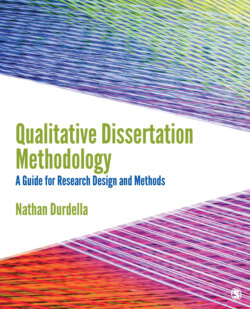Читать книгу Qualitative Dissertation Methodology - Nathan Durdella - Страница 17
На сайте Литреса книга снята с продажи.
Ensuring that Qualitative Methodology Is the Right Fit for Your Dissertation Research Interests
ОглавлениеIn all likelihood, you have thought seriously about or even committed to using qualitative approach in your dissertation study that is qualitative—and maybe you have already started work on the background and/or qualitative research design of your dissertation proposal. In my own dissertation research work, I committed early on to using qualitative research design and methods, taking methods classes in qualitative inquiry and using a yearlong course sequence to pilot a qualitative dissertation study. (Ultimately, I pursued a new topic but retained a qualitative research approach for my dissertation study). Wherever you are at in your efforts to develop an approach to gather and make sense of information for your dissertation project, you must confirm if qualitative research is the right fit for your research interests.
When you consider qualitative research, the general purposes associated with approaches that use qualitative research design and methods tend to cluster around a few central concepts—which offer a clue to what qualitative researchers value and do in their work. Taken together, these concepts reveal what qualitative researchers do—the goals of their projects, the work that they do in the field, the products of their fieldwork, and the stories that they tell. These ideas relate to the following:
1 description;
2 discovery (Ambert, Alder, Alder, & Detzner, 1995);
3 exploration, especially related to how and why people behave (Ambert et al.);
4 interpretation (Peshkin, 1993); and
5 verification (Peshkin).
Here, you can see the overarching directions of qualitative research, with an aim toward extended exploration of in-depth descriptions of human social life. Indeed, the overall approach in qualitative research traditions moves researchers into the field to learn from and discover folks in their daily lives. This inquiry approach to social and behavioral science research is distinct from quantitative and mixed methods approaches, which generally focus on hypothesis testing and prediction.
Given the arc of qualitative research, you should be interested in exploring and describing (rather than hypothesis testing and prediction in quantitative research). Do you have an interest in description and exploration? How does your current thinking about your dissertation project measure up to the general interests and focus of qualitative research? Before you answer these questions and set the course of your study, you should complete an initial review of the empirical literature in areas related to your research topic and interests. No need to do an exhaustive search, evaluation, and synthesis of research work related to what you want to do right now! Unless you are at a stage in the research process where you have a good grasp of current work in the field, you can focus on recent publications and/or readings from class discussions and assignments to distill an early research problem and purpose—which will allow you to confirm if the qualitative approach that you have in mind is the right one for your study.
